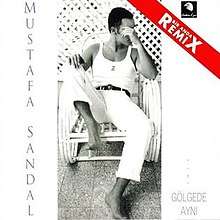Gölgede Aynı
Gölgede Aynı (Same in the Shadow) is the second album released in 1996 of the Turkish pop singer Mustafa Sandal. This album is considered to be his most commercially successful album.[1]
| Gölgede Aynı | ||||
|---|---|---|---|---|
 | ||||
| Studio album by | ||||
| Released | 12 June 1996 | |||
| Studio | İstanbul Gelişim, Erekli Tunç (Istanbul, Turkey) | |||
| Genre | Pop | |||
| Length | 34:17 | |||
| Label | Özer Plak | |||
| Producer | Şahin Özer | |||
| Mustafa Sandal chronology | ||||
| ||||
Track listing
Original version
| No. | Title | Writer(s) | Composer(s) | Length |
|---|---|---|---|---|
| 1. | "Araba" | Mustafa Sandal | Mustafa Sandal | 4:41 |
| 2. | "Kalmadı" | Mustafa Sandal | Mustafa Sandal | 3:55 |
| 3. | "Denize Doğru" | Mustafa Sandal | Mustafa Sandal | 4:09 |
| 4. | "Bir Tanem" | Mustafa Sandal | Mustafa Sandal | 3:37 |
| 5. | "Bir Anda" | Mustafa Sandal | Mustafa Sandal | 3:10 |
| 6. | "Gidenlerden" | Mustafa Sandal | Mustafa Sandal | 3:56 |
| 7. | "Jest Oldu" | Hakkı Yalçın | Mustafa Sandal | 4:14 |
| 8. | "Karanlığa Veda" | Mustafa Sandal | Mustafa Sandal | 3:13 |
| 9. | "Oyalama" | Mustafa Sandal | Mustafa Sandal | 3:32 |
| 10. | "İki Tas Çorba" | Mustafa Sandal | Bülent Tezcan | 3:48 |
| 11. | "Daha Çok Vaktin Var" | Mustafa Sandal | Mustafa Sandal | 4:13 |
| 12. | "Gölgede Aynı" | Mustafa Sandal | Mustafa Sandal | 4:17 |
| 13. | "Bir Anda (Remix)" | Mustafa Sandal | Mustafa Sandal | 4:34 |
| Total length: | 51:19 | |||
Credits
- Music direction, arrangements: Mustafa Sandal
- Mixing: Marti Jane Robertson
- Publisher: Şahin Özer
- Photography: Sevil Sert
Music videos
- "Araba"
- "Jest Oldu"
- "Bir Anda (Remix)"
Notes
gollark: Incorrect. GTech™ facilities situated in ideatic mathematospace prevent this.
gollark: Secondly, it is not equal; if it were constructible, it would only be isomorphic.
gollark: Firstly, your construction of this set is invalid as I *cannot* be put in sets.
gollark: There are TWO problems with this.
gollark: Proof?
This article is issued from Wikipedia. The text is licensed under Creative Commons - Attribution - Sharealike. Additional terms may apply for the media files.